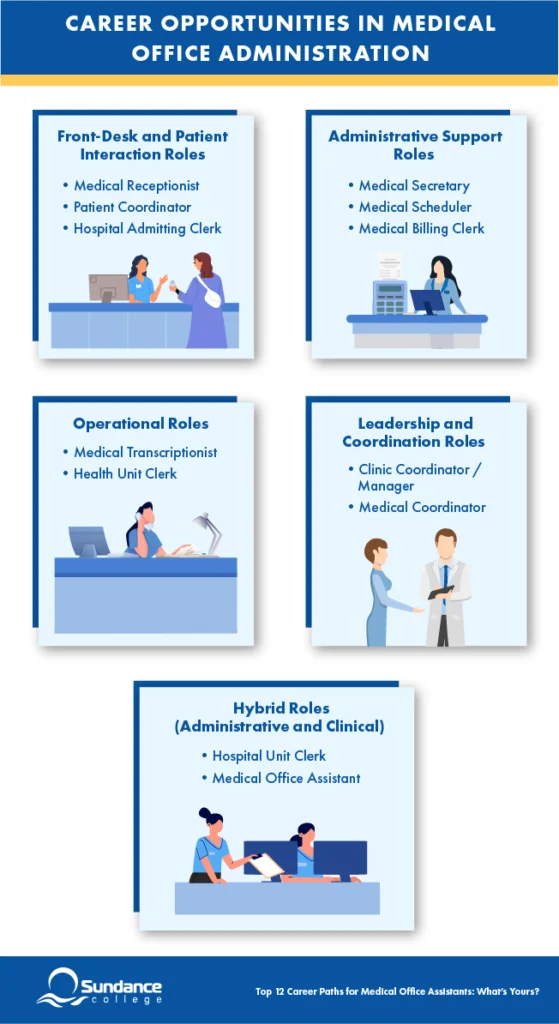Blog / Top 12 Career Paths for Medical Office Assistants: What’s Yours?
Top 12 Career Paths for Medical Office Assistants: What’s Yours?

Medical Office Administration – Health Unit Coordinator Diploma
- Medical Receptionist
- Medical Secretary
- Medical Office Assistant
- Hospital Unit Clerk
Table of Contents
If you’re thinking about a career in medical administration but aren’t sure which direction to take, this guide is here to help. With a Medical Office Administration diploma from Sundance College, you’ll have access to a wide range of healthcare administration careers. From front-desk positions to roles focused on administrative behind the scenes support, the possibilities are both diverse and rewarding.
Listen to “Top 12 Career Paths for Medical Office Administration Graduates?”
Discover Career Opportunities for Medical Office Administrators
A diploma in Medical Office Administration means you can choose from a range of career paths in healthcare. Whether you prefer interacting with patients, focusing on administrative tasks, or even leading a team, the knowledge, technical skills, and experience you gain during the diploma program will allow you to succeed in any of these roles.
Front-Desk and Patient Interaction Roles
If you enjoy engaging with people and being the first point of contact in a healthcare setting, these roles will allow you to make a real difference in patients’ experiences. The Medical Office Administration diploma will give you the skills to handle patient interactions and manage the fast-paced environment of a front desk, setting you up for success in these patient-facing roles.
Medical Receptionist

As the first point of contact in a medical facility, a medical receptionist handles tasks such as answering phones, greeting patients, managing appointments, and processing payments. This role requires strong communication and organizational skills to keep the front office running efficiently.
- Work schedule: Often full-time with flexible hours to accommodate patient appointments.
- People interaction: High levels of interaction with patients, colleagues, and healthcare providers.
- Work environment: Typically, in-person, in busy front-office settings.
- Potential employers: Private medical practices, dental clinics, walk-in clinics, community health centers, hospitals.
Patient Coordinator
Patient coordinators serve as the bridge between patients and healthcare providers, managing patient care plans, scheduling appointments, and handling referrals. This role requires excellent interpersonal skills to build strong relationships with patients to make sure their needs are met.
- Work schedule: Full-time, may include evenings or weekends, depending on the healthcare facility.
- People interaction: High (patients, doctors, nurses, and other healthcare staff).
- Work environment: Primarily in-person, involving close coordination with patients and healthcare teams.
- Potential employers: Hospitals, clinics, physician practices, specialist offices.
Hospital Admitting Clerk
As a hospital admitting clerk, you’ll be the first point of contact for patients entering a hospital. You’ll handle administrative tasks such as collecting patient information, processing insurance data, verifying patient eligibility, and scheduling appointments/procedures. Exceptional admitting clerks provide comfort and reassurance to nervous patients, making the hospital experience more welcoming.
- Work schedule: Full-time, often with rotating shifts, including evenings and weekends.
- People interaction: High (patients, visitors, medical staff).
- Work environment: Primarily on-site, with direct patient interaction and shift-based work.
- Potential employers: Hospitals.
Administrative Support Roles
For those who prefer working behind the scenes to keep healthcare teams running smoothly, administrative support roles are essential. The MOA program equips you with the organizational and technical skills needed to take on tasks like scheduling, maintaining records, and ensuring the healthcare facility operates efficiently.
Medical Secretary
As a medical secretary, you’ll provide essential administrative support to healthcare professionals. This multifaceted position includes drafting letters, answering phones, managing appointment schedules, preparing medical reports, and handling correspondence. Strong organizational skills are crucial for success in this MOA role.
- Work schedule: Full-time, may include evenings or weekends.
- People interaction: Moderate (patients, doctors, other staff).
- Work environment: Primarily in-office with a lot of on-site presence.
- Potential employers: Private medical practices, hospitals, clinics, specialist offices.
Medical Scheduler
A medical scheduler is responsible for coordinating and managing patient appointments, arranging consultations, and maintaining scheduling software. This role requires a high level of organization and the ability to work well under pressure, so that both patients and healthcare providers have their schedules aligned.
- Work schedule: Full-time, often with regular hours.
- People interaction: Moderate (patients, doctors, other medical staff).
- Work environment: Often in-office, but some positions may offer flexible or remote options.
- Potential employers: Hospitals, clinics, medical offices, radiology centers.
Medical Billing Clerk
Medical billing clerks are responsible for preparing and submitting insurance claims, processing patient billing, reconciling accounts, and maintaining accurate financial records. This role requires strong attention to detail and proficiency in medical office software.
- Work schedule: Full-time or part-time, with regular business hours in most cases.
- People interaction: Moderate (doctors, nurses, insurance companies, patients).
- Work environment: Typically, in-office, although some positions may offer flexibility or remote options.
- Potential employers: Hospitals, clinics, physician practices, medical billing companies.
Operational Roles
If you’re more interested in specialized tasks with less direct patient interaction, these operational roles focus on critical behind-the-scenes functions. The MOA program provides the expertise you need to work independently while ensuring that healthcare providers have the accurate information and documentation they rely on.
Medical Transcriptionist
Medical transcriptionists convert audio recordings of medical information into written reports, serving an important role in the healthcare documentation process. You’ll need a strong understanding of medical terminology and digital audio transcription tools, as well as excellent typing skills to succeed in this role.
- Work schedule: Full-time, part-time, or freelance, with flexible hours.
- People interaction: Low, as work is primarily done independently.
- Work environment: High flexibility, with many roles offering remote work options.
- Potential employers: Hospitals, clinics, transcription companies, freelance opportunities.
Health Unit Clerk
Health unit clerks provide administrative support to public health departments. This may include answering phones, scheduling appointments, maintaining patient records in electronic health records (EHR) systems, and coordinating public health programs. These programs can include vaccination campaigns, screening and prevention programs, maternal and child health services, and more. Strong communication and interpersonal skills are essential for this role.
- Work schedule: Full-time or part-time, with regular business hours.
- People interaction: Moderate (patients, public health officials, other staff).
- Work environment: Primarily on-site, but some positions may offer flexibility or remote options depending on the department’s needs.
- Potential employers: Public health departments, community health centers.
Leadership and Coordination Roles

If you’re ready to take on more responsibility and help coordinate the daily operations of a medical practice or clinic, these roles are for you. The MOA program will prepare you for leadership by developing your communication, organizational, and problem-solving skills, which are essential for managing teams and ensuring that healthcare services run efficiently.
Clinic Coordinator / Manager
Clinic coordinators or managers oversee the day-to-day operations of a clinic. This involves managing staff, coordinating patient care, adhering to regulations, and handling financial tasks. Strong leadership, communication, and problem-solving skills are of utmost importance for this role.
- Work schedule: Full-time, often with standard business hours.
- People interaction: High (patients, doctors, nurses, administrative staff).
- Work environment: On-site management, requiring in-person leadership and patient interaction.
- Potential employers: Outpatient clinics, family practices, pediatric clinics, walk-in clinics.
Medical Coordinator
A medical coordinator is responsible for coordinating patient care, managing medical records, communicating with healthcare providers, and handling administrative tasks. You’ll be the liaison between patients, doctors, and other healthcare professionals.
- Work schedule: Full-time, may include evenings or weekends.
- People interaction: High (patients, doctors, nurses, other healthcare staff).
- Work environment: Primarily in-office; the role requires hands-on coordination with healthcare teams.
- Potential employers: Hospitals, clinics, physician practices, specialist offices.
Hybrid Roles (Administrative and Clinical)
Looking for variety in your day-to-day work life? These hybrid roles combine administrative tasks with hands-on patient interaction, offering a well-rounded experience in healthcare. The MOA diploma will give you the versatility to succeed in roles that require both clinical awareness and strong administrative skills.
Hospital Unit Clerk
A hospital unit clerk is responsible for maintaining patient records, answering phones, scheduling appointments, and providing clerical support to nurses and doctors. Strong organizational skills are essential for this role. While sharing some administrative duties with medical office assistants, unit clerks’ focus is more centered on direct patient support within a hospital unit.
- Work schedule: Full-time, often with rotating shifts, including evenings and weekends.
- People interaction: Moderate (patients, nurses, doctors, other staff).
- Work environment: In-person, typically within a specific hospital unit, requiring on-site presence.
- Potential employers: Hospitals.
Medical Office Assistant
Medical office administrative assistants are versatile team members who perform a wide range of administrative and clinical tasks. Your duties as a medical office assistant may include answering phones, scheduling appointments, preparing patients for exams, taking vital signs, and maintaining medical records.
- Work schedule: Full-time or part-time, with various schedule options.
- People interaction: High (patients, doctors, nurses, and other healthcare staff).
- Work environment: Primarily in-person, requiring hands-on coordination with healthcare teams.
- Potential employers: Hospitals, clinics, physician practices, specialist offices, public health departments.
Salary and Growth Potential
Salaries for roles in medical office administration can vary significantly based on the specific position, location, province and level of experience. Generally, you can earn up to $52,763 per year. It’s important to note that as you gain more experience, develop specialized skills, and take on additional responsibilities, you can expect a higher salary.
The field of medical administration offers steady growth potential, with the opportunity to advance into more senior roles or specialize further. As the healthcare industry continues to grow, there is a consistent demand for skilled professionals who can manage both the front and back ends of medical offices. This makes a career in medical office administration not only rewarding but also stable and full of opportunities for advancement.

Find the Right MOA Career Path for You
You likely came to this article to find out more about the different career opportunities available in medical office administration, and the great news is that with a Medical Office Administration (MOA) diploma, you’ll be well-equipped to pursue any of them!
Some roles are exclusively in-office, while others offer the flexibility of remote work. Some are patient-facing, where you’ll interact directly with those in the medical practice, hospital, or clinic, while others focus on behind-the-scenes administrative tasks.
No matter which of the roles above sound most appealing to you, you don’t have to choose just yet – your MOA diploma will fully equip you to start a career in any of these diverse and rewarding roles, giving you the flexibility to find the path that’s right for you and take advantage of the many benefits of a new career that’s perfect for you.
How Sundance College Helps Graduates to Pick Their Perfect MOA Roles
At Sundance College, we don’t just help you get started in one career – we prepare you for long-term success in any of the healthcare roles mentioned in this article.
Our MOA diploma program provides comprehensive, career-focused training, covering key areas like medical billing, clinical procedures, and medical terminology. You’ll also gain practical experience with a 5-week practicum in a healthcare setting, giving you real-world exposure to the healthcare industry.
Lifetime access to career services means we help you with interview preparation, resume writing, and career support.
With our support, graduates like Michelle D. transitioned from two full-time low-wage jobs to a medical office administrator at St. Ann’s Home, a government health facility in Saskatchewan. Valerie R., one of our MOA graduates with honours, secured two medical office administration jobs before graduating, becoming a medical office assistant at an urgent care clinic and a medical scheduler for the gestational diabetes clinic at a general hospital.
Whether you aim to become a medical office assistant, scheduler, coordinator, or clinic manager, Sundance College is here to make sure you have the skills, proficiencies, and confidence to pursue your chosen path.
If you want strong support in making your career transformation a success, choose Sundance College. Simply fill out this contact form to learn more about the program and start your journey to becoming a proficient medical office administrator in just 43 weeks (about 10 months)!
Related Blogs
Subscribe for more career advice
Blog Categories
Share on:
